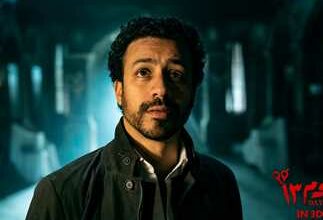Acclaimed filmmaker Dawoud Abdel Sayed returns after an eight-year absence with "Rasa’il el-Bahr" (Messages from the Sea), the story of Yehia, a recent medical school graduate painfully self-conscious about his speech impediment. We meet Yehia, played by Asser Yassin, as the nearest members of his family have just passed away. He is left alone at the mercy of his own devices, and decides to return to the family flat in Alexandria. There he secures a modest income as a fisherman and, drinking to fill the void in his life, awkwardly attempts to reignite an old flame. Eventually his guileless love of music gets him caught up in the whirlwind of an unconventional romance.
The city by the sea, with all its seductive charm, is a dominant character in the film. With faultless art direction, the vibrant streets and fish markets contrast with elegant homes and ateliers sparsely adorned with antiques and objets d’art. When Yehia departs from a day’s work to the rhythm of waves crashing against the rocks, he roams restlessly through a metropolis that is an anachronistic throwback to a bygone era, aggressively contemporary and resolutely cosmopolitan all at once.
The film imbues this spellbinding portrayal of Alexandria with strong performances by the actors. Yassin’s intelligently understated execution of his role allows viewers to empathize with his character’s predicaments, and he tackles Yehia’s irregular stutter with an unpronounced deftness. Basma, in the role of Nora, the girl Yehia meets on a rainy night and assumes to be a lady of the evening, delivers her strongest performance to date. Often confined to the role of a vacuous romantic interest to the lame brained hero, and last seen stiffly walking through an uninspired sitcom, her potential is unleashed in full force. She navigates seamlessly through a shape-shifting role, and adeptly delivers in emotionally demanding scenes.
Brimming with talent, the film also boasts a stellar supporting cast. Salah Abdullah excels as the boorishly ruthless landlord, darkened with a disturbing brand of matter-of-fact fundamentalism, and intent on tearing downYehia’s home to expand his empire of malls. Mohamed Lofty achingly underscores the remorse of a brawny bodyguard who selflessly bails Yehia out of trouble time and again, and Mai el-Kassab, who ordinarily inhabits the crass world of sitcoms, plays a ditzy character enamored with Yehia with a sweet warmth that it is hard to resist. In the span of one scene, Ahmed Kamal effortlessly personifies Nora’s demons.
The talent behind the camera is no less impressive. In an untimely storm sequence where the Gods frustrate Yehia at his most desperate hour, the awe-inspiring brute force of the heavens, held back by a thin shield of ominous gray clouds, is rendered powerfully by the exquisite cinematography of Ahmed Morsy . His lens also ensnares the lush lighting of the Alexandrian interiors and boldly frames faces betraying variegated shades of emotion. Unsung hero Rageh Dawoud delivers a haunting score whose quiet and infectious exhalations set the film’s tone almost imperceptibly, and persist long after the closing credits.
The film’s narrative is not bound by formulaic conventions that require a compact plot inhabited with characters chasing obvious objectives. Our protagonist here starts out pretty much aimless, and we gradually recognize that a denouement will only occur when his life gains substance and meaning through hard-won maturity. It is the tricky terrain of the evolution of the soul, usually limited to the novel, where inner thoughts can be conveniently explored, and it is difficult to convey on film. The secondary characters do not impel subplots that interlace with the central storyline in a contrived knot of interdependence, as has become customary in action-driven films; rather they serve to define and enrich the central character’s world, as they inhabit that singular province on an equal footing.
"Rasa’il el-Bahr" is one of those rare gems that does not set out to exploit its viewer with tested devices. Those willing to surrender to the vision of its helmer will find themselves drawn in to the stirring story of a young man who, through a series of hard knocks and a little good fortune, inches that much closer to the person he had hoped to become. In the last scene of the film, where a crasser world envelopsYehia and Nora as they taste exhilaration in the face of the unknown, el-Sayed skillfully keeps the heavy-handedness of inevitable symbolism at bay and finds the right time to draw the curtain on an absorbing open ending.
With this praiseworthy offering, the director has admirably gratified a legion of fans long awaiting his comeback. Be sure to catch this film in what may be a limited run. When the dust settles on the thirty or so films slated for release this year, this will most likely be the one you are glad you did not miss.




